- Home
- Ernest Hemingway
The Old Man and the Sea Page 8
The Old Man and the Sea Read online
Page 8
"Nothing," he said aloud. "I went out too far."
When he sailed into the little harbour the lights of the Terrace were out and he knew everyone was in bed. The breeze had risen steadily and was blowing strongly now. It was quiet in the harbour though and he sailed up onto the little patch of shingle below the rocks. There was no one to help him so he pulled the boat up as far as he could. Then he stepped out and made her fast to a rock.
He unstepped the mast and furled the sail and tied it. Then he shouldered the mast and started to climb. It was then he knew the depth of his tiredness. He stopped for a moment and looked back and saw in the reflection from the street light the great tail of the fish standing up well behind the skiff's stern. He saw the white naked line of his backbone and the dark mass of the head with the projecting bill and all the nakedness between.
He started to climb again and at the top he fell and lay for some time with the mast across his shoulder. He tried to get up. But it was too difficult and he sat there with the mast on his shoulder and looked at the road. A cat passed on the far side going about its business and the old man watched it. Then he just watched the road.
Finally he put the mast down and stood up. He picked the mast up and put it on his shoulder and started up the road. He had to sit down five times before he reached his shack.
Inside the shack he leaned the mast against the wall. In the dark he found a water bottle and took a drink. Then he lay down on the bed. He pulled the blanket over his shoulders and then over his back and legs and he slept face down on the newspapers with his arms out straight and the palms of his hands up.
He was asleep when the boy looked in the door in the morning. It was blowing so hard that the drifting boats would not be going out and the boy had slept late and then come to the old man's shack as he had come each morning. The boy saw that the old man was breathing and then he saw the old man's hands and he started to cry. He went out very quietly to go to bring some coffee and all the way down the road he was crying.
Many fishermen were around the skiff looking at what was lashed beside it and one was in the water, his trousers rolled up, measuring the skeleton with a length of line.
The boy did not go down. He had been there before and one of the fishermen was looking after the skiff for him.
"How is he?" one of the fishermen shouted.
"Sleeping," the boy called. He did not care that they saw him crying. "Let no one disturb him."
"He was eighteen feet from nose to tail," the fisherman who was measuring him called.
"I believe it," the boy said.
He went into the Terrace and asked for a can of coffee.
"Hot and with plenty of milk and sugar in it."
"Anything more?"
"No. Afterwards I will see what he can eat."
"What a fish it was," the proprietor said. "There has never been such a fish. Those were two fine fish you took yesterday too."
"Damn my fish," the boy said and he started to cry again.
"Do you want a drink of any kind?" the proprietor asked.
"No," the boy said. "Tell them not to bother Santiago. I'll be back."
"Tell him how sorry I am."
"Thanks," the boy said.
The boy carried the hot can of coffee up to the old man's shack and sat by him until he woke. Once it looked as though he were waking. But he had gone back into heavy sleep and the boy had gone across the road to borrow some wood to heat the coffee.
Finally the old man woke.
"Don't sit up," the boy said. "Drink this." He poured some of the coffee in a glass.
The old man took it and drank it.
"They beat me, Manolin," he said. "They truly beat me."
"He didn't beat you. Not the fish."
"No. Truly. It was afterwards."
"Pedrico is looking after the skiff and the gear. What do you want done with the head?"
"Let Pedrico chop it up to use in fish traps."
"And the spear?"
"You keep it if you want it."
"I want it," the boy said. "Now we must make our plans about the other things."
"Did they search for me?"
"Of course. With coast guard and with planes."
"The ocean is very big and a skiff is small and hard to see," the old man said. He noticed how pleasant it was to have someone to talk to instead of speaking only to himself and to the sea. "I missed you," he said. "What did you catch?"
"One the first day. One the second and two the third."
"Very good."
"Now we fish together again."
"No. I am not lucky. I am not lucky anymore."
"The hell with luck," the boy said. "I'll bring the luck with me."
"What will your family say?"
"I do not care. I caught two yesterday. But we will fish together now for I still have much to learn."
"We must get a good killing lance and always have it on board. You can make the blade from a spring leaf from an old Ford. We can grind it in Guanabacoa. It should be sharp and not tempered so it will break. My knife broke."
"I'll get another knife and have the spring ground. How many days of heavy brisa have we?"
"Maybe three. Maybe more."
"I will have everything in order," the boy said. "You get your hands well old man."
"I know how to care for them. In the night I spat something strange and felt something in my chest was broken."
"Get that well too," the boy said. "Lie down, old man, and I will bring you your clean shirt. And something to eat."
"Bring any of the papers of the time that I was gone," the old man said.
"You must get well fast for there is much that I can learn and you can teach me everything. How much did you suffer?"
"Plenty," the old man said.
"I'll bring the food and the papers," the boy said. "Rest well, old man. I will bring stuff from the drugstore for your hands."
"Don't forget to tell Pedrico the head is his."
"No. I will remember."
As the boy went out the door and down the worn coral rock road he was crying again.
That afternoon there was a party of tourists at the Terrace and looking down in the water among the empty beer cans and dead barracudas a woman saw a great long white spine with a huge tail at the end that lifted and swung with the tide while the east wind blew a heavy steady sea outside the entrance to the harbour.
"What's that?" she asked a waiter and pointed to the long backbone of the great fish that was now just garbage waiting to go out with the tide.
"Tiburon," the waiter said. "Eshark." He was meaning to explain what had happened.
"I didn't know sharks had such handsome, beautifully formed tails."
"I didn't either," her male companion said.
Up the road, in his shack, the old man was sleeping again. He was still sleeping on his face and the boy was sitting by him watching him. The old man was dreaming about the lions.
ABOUT THE AUTHOR
ERNEST HEMINGWAY was born in Oak Park, Illinois, in 1899, and began his writing career for The Kansas City Star in 1917. During the First World War he volunteered as an ambulance driver on the Italian front but was invalided home, having been seriously wounded while serving with the infantry. In 1921 Hemingway settled in Paris, where he became part of the expatriate circle of Gertrude Stein, F. Scott Fitzgerald, Ezra Pound, and Ford Madox Ford. His first book, Three Stories and Ten Poems, was published in Paris in 1923 and was followed by the short story selection In Our Time, which marked his American debut in 1925. With the appearance of The Sun Also Rises in 1926, Hemingway became not only the voice of the "lost generation" but the preeminent writer of his time. This was followed by Men Without Women in 1927, when Hemingway returned to the United States, and his novel of the Italian front, A Farewell to Arms (1929). In the 1930s, Hemingway settled in Key West, and later in Cuba, but he traveled widely--to Spain, Italy, and Africa--and wrote about his experiences in Death in the Afternoon
(1932), his classic treatise on bullfighting, and Green Hills of Africa (1935), an account of big-game hunting in Africa. Later he reported on the Spanish Civil War, which became the background for his brilliant war novel, For Whom the Bell Tolls (1939), hunted U-boats in the Caribbean, and covered the European front during the Second World War. Hemingway's most popular work, The Old Man and the Sea, was awarded the Pulitzer Prize in 1953, and in 1954 Hemingway won the Nobel Prize in Literature "for his powerful, style-forming mastery of the art of narration." One of the most important influences on the development of the short story and novel in American fiction, Hemingway has seized the imagination of the American public like no other twentieth-century author. He died, by suicide, in Ketchum, Idaho, in 1961. His other works include The Torrents of Spring (1926), Winner Take Nothing (1933), To Have and Have Not (1937), The Fifth Column and the First Forty-Nine Stories (1938), Across the River and Into the Trees (1950), and posthumously, A Moveable Feast (1964), Islands in the Stream (1970), The Dangerous Summer (1985), and The Garden of Eden (1986).
AUDIO EDITION ALSO AVAILABLE
MEET THE AUTHORS, WATCH VIDEOS AND MORE AT
SimonandSchuster.com
* THE SOURCE FOR READING GROUPS *
JACKET DESIGN BY REX BONOMELLI JACKET ILLUSTRATION BY C. F. TUNNICLIFFE
AUTHOR PHOTOGRAPH BY LLOYD ARNOLD
COPYRIGHT (c) 2010 SIMON & SCHUSTER
BOOKS BYERNEST HEMINGWAY
NOVELS
The Torrents of Spring
The Sun Also Rises
A Farewell to Arms
To Have and Have Not
For Whom the Bell Tolls
Across the River and Into the Trees The Old Man and the Sea
Islands in the Stream
The Garden of Eden
True at First Light
A Farewell to Arms: The Hemingway Library Edition
STORIES
In Our Time
Men Without Women
Winner Take Nothing
The Fifth Column and Four Stories of the Spanish Civil War The Short Stories of Ernest Hemingway The Snows of Kilimanjaro and Other Stories The Nick Adams Stories
The Complete Short Stories of Ernest Hemingway
NONFICTION
Death in the Afternoon
Green Hills of Africa
Selected Letters 1917-1961
A Moveable Feast
The Dangerous Summer
Dateline: Toronto
By-Line: Ernest Hemingway
A Moveable Feast: The Restored Edition
ANTHOLOGIES
On Writing
Hemingway on Fishing
Hemingway on Hunting
Hemingway on War
We hope you enjoyed reading this Scribner eBook.
* * *
Join our mailing list and get updates on new releases, deals, bonus content and other great books from Scribner and Simon & Schuster.
CLICK HERE TO SIGN UP
or visit us online to sign up at
eBookNews.SimonandSchuster.com
SCRIBNER
1230 Avenue of the Americas
New York, NY 10020
www.SimonandSchuster.com
This book is a work of fiction. Names, characters, places, and incidents either are products of the author's imagination or are used fictitiously. Any resemblance to actual events or locales or persons, living or dead, is entirely coincidental.
Copyright (c) 1952 by Ernest Hemingway
Copyright renewed (c) 1980 by Mary Hemingway
Illustrations by C. F. Tunnicliffe and Raymond Sheppard
All rights reserved, including the right of reproduction in whole or in part in any form.
SCRIBNER and design are trademarks of Simon & Schuster Inc.
Set in Adobe Sabon
Designed by Brooke Zimmer
First Scribner ebook edition 2002
All inquiries about print and electronic permissions (use of excerpts) for books and other works by Ernest Hemingway can be sent by email to: [email protected], or by regular mail to Simon & Schuster, Inc., Permissions Dept., 1230 Avenue of the Americas, New York, New York 10020, or by fax to (212) 698-7284.
Visit https://authors.simonandschuster.com/Ernest-Hemingway/1792713 for additional information about Ernest Hemingway.
ISBN 0-7432-3730-7
ISBN-13: 978-0-7432-3730-7 (ebook)

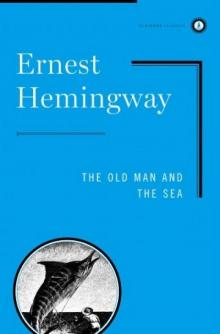 The Old Man and the Sea
The Old Man and the Sea Green Hills of Africa
Green Hills of Africa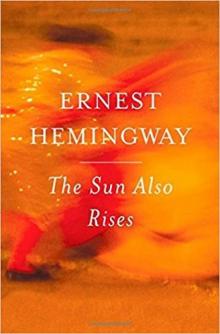 The Sun Also Rises
The Sun Also Rises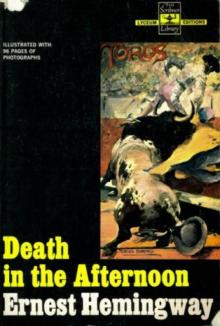 Death in the Afternoon
Death in the Afternoon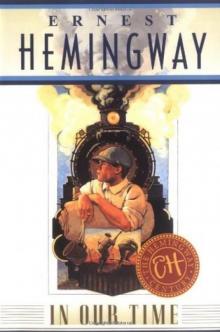 In Our Time
In Our Time For Whom the Bell Tolls
For Whom the Bell Tolls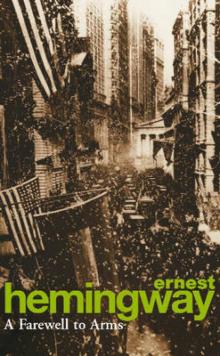 A Farewell to Arms
A Farewell to Arms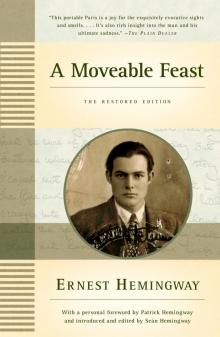 A Moveable Feast
A Moveable Feast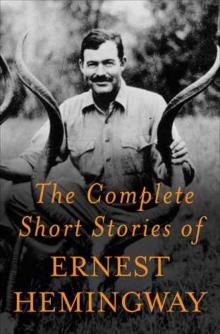 The Complete Short Stories of Ernest Hemingway
The Complete Short Stories of Ernest Hemingway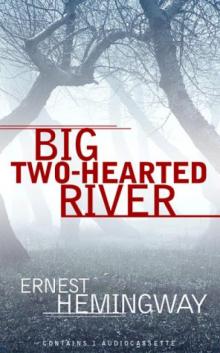 Big Two-Hearted River
Big Two-Hearted River Winner Take Nothing
Winner Take Nothing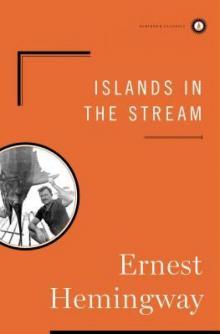 Islands in the Stream
Islands in the Stream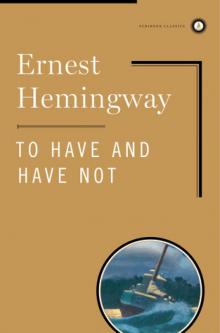 To Have and Have Not
To Have and Have Not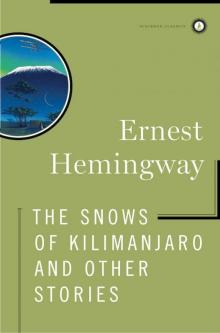 The Snows of Kilimanjaro and Other Stories
The Snows of Kilimanjaro and Other Stories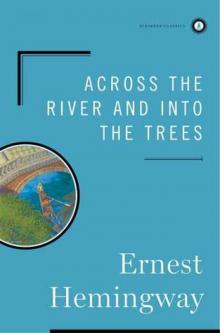 Across the River and Into the Trees
Across the River and Into the Trees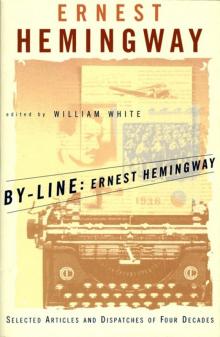 By-Line Ernest Hemingway
By-Line Ernest Hemingway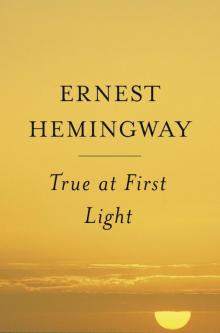 True at First Light
True at First Light Men Without Women
Men Without Women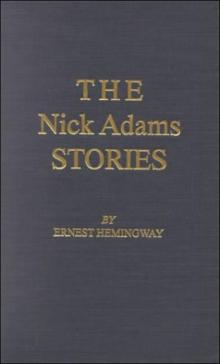 The Nick Adams Stories
The Nick Adams Stories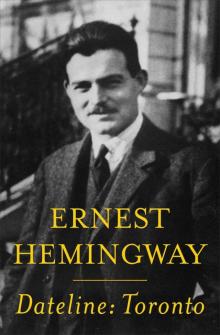 Dateline- Toronto
Dateline- Toronto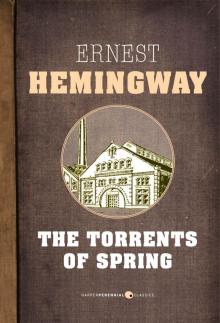 The Torrents of Spring
The Torrents of Spring Short Stories
Short Stories